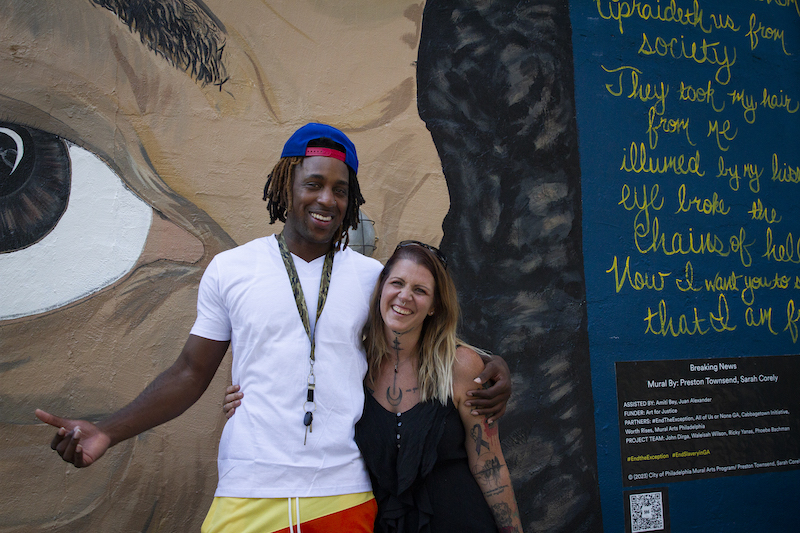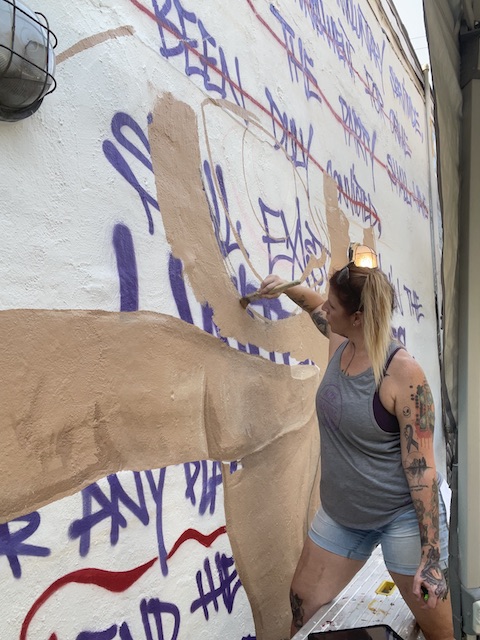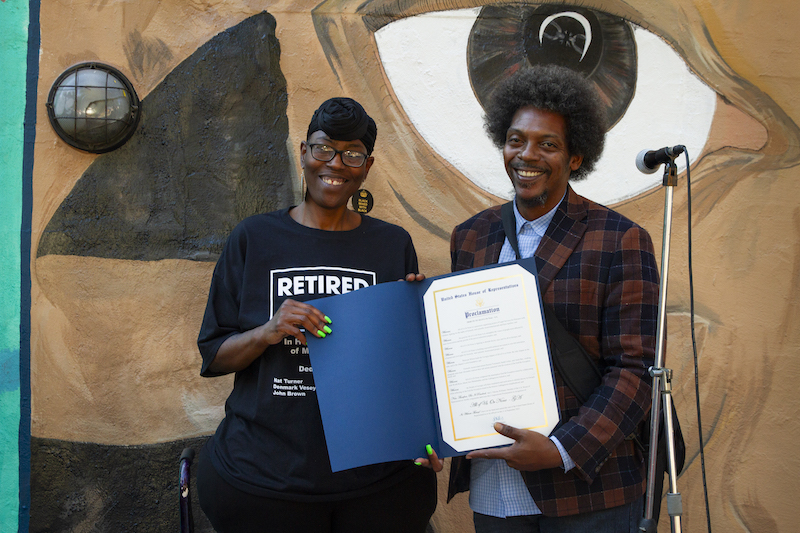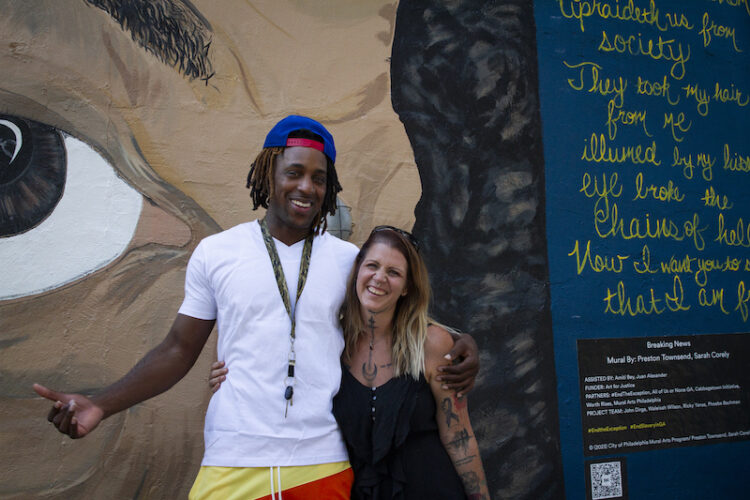Painted on the front of the 97 Estoria bar in Cabbagetown, next to the Krog Street Tunnel, is the striking image of a man’s face, with one eye covered behind his hair and the other eye staring piercingly ahead. The man in the mural is Preston Townsend, a local poet and the artist who conceptualized the mural.
Titled Breaking News, the mural is a collaboration between three local, formerly incarcerated artists. It is one in a series of murals by End the Exception, a national campaign to remove the clause in the 13th Amendment that allows incarcerated people to be used for “slavery” or “involuntary servitude.”

The 13th Amendment states: “Neither slavery nor involuntary servitude, except as a punishment for crime whereof the party shall have been duly convicted, shall exist within the United States, or any place subject to their jurisdiction.”
End the Exception seeks to remove the middle part of the phrase, the exception, from the amendment. In fact, this text was spray painted onto the wall in Cabbagetown so the mural could be painted over it, a strong symbolic gesture.
Together with Worth Rises and Mural Arts Philadelphia, End the Exception is dedicating public murals to the cause in six cities throughout the country.
The three groups partnered with the Cabbagetown Wall Committee and Georgia’s chapter of the activist group All of Us, or None, and the organizations decided upon Cabbagetown’s 97 Estoria as the perfect place for Atlanta’s mural.
Artist Sarah Corley started painting when she was incarcerated; now she works as a peer mentor inside that prison. She learned about the project when community members reached out and suggested she become involved. After collaborating with fellow artists Townsend and Amiti Bey, Corley set to work on the mural, even spending time painting under the recent rare blue moon, an experience she described as “surreal.”

“This project has probably been the most rewarding for me because it’s very full circle,” Corley said.
When interacting with the other artists she learned “everyone has some kind of connection to the judicial system and an understanding of what it feels like. Being able to work together and collaborate has been awesome. I’ve worked with other artists before, but never other artists that come from the same system. It’s a different perspective, a different viewpoint on how you see the world, even the gratitude we have for where we are today.”
The text on the mural now is a poem by Townsend drawing from his incarceration experience. It reads: “Ye are those whom upbraideth us from society. They took my hair from me. Illumed by my history, eye broke the chains of hell. Now I want you to see that I am free.”
Before the ribbon cutting that officially dedicated the new mural, a series of formerly incarcerated activists, academics and poets discussed the grueling reality of work in prisons.
“I was working for eight to 10 hours a day for a bologna sandwich — sometimes green or brown bologna,” said activist Jessica Umberger. “I wanted to get home to my daughter. She was 2 when I left. She’s 8 now and we’re just getting to know each other.”
Others at the event spoke about years of unpaid labor for major corporations while they were incarcerated, only to be released and find out those companies wouldn’t hire them.
After the mural dedication, community members were invited to the Cabbagetown Community Center to view the documentary “Working in Captivity: A Woman’s Quest to End Slavery in Georgia.” The short film was made by All of Us or None activist Waleisah Wilson. She was recognized at the event for her public service by Ernest Boston from U.S. Rep. Nikema Williams’ office.
“They aren’t going to pay you $30 an hour for a job when they can get slaves to do it for free,” Wilson said. “This is about ending a racist and profit-driven system [of] leasing people out for money. That sounds like human trafficking to me.”

Originally, activists struggled to find a space in Atlanta that would be comfortable with such a political message. Cabbagetown Wall Committee member John Dirga said that many businesses use their open space for marketing graphics, and several are afraid to take a political stance for fear of alienating customers.
“Cabbagetown isn’t afraid of speaking truth to power,” Dirga said. “On our Forward Warrior wall, there’s lots of representation and social justice messaging on LGBTQ rights, Black Lives Matter and amplifying indigenous voices. [The organizers] knew this would be a place where we could take a stand on issues that some people find complex.”
Every individual involved with the ribbon-cutting event was formerly incarcerated, including the artists, activists, poets and even the caterer.
“It means a lot,” Corley said, explaining how the event and the mural itself have initiated conversation about the impact of forced labor in prisons. “The mentality I came out of prison with is not the same one I went in with. I’ve been out five years; now I know my worth. I know my value. Our voice matters.”
::
Luke Gardner is an Atlanta-based journalist with a history of covering the arts. Luke is passionate about serving local communities and celebrating marginalized identities.

